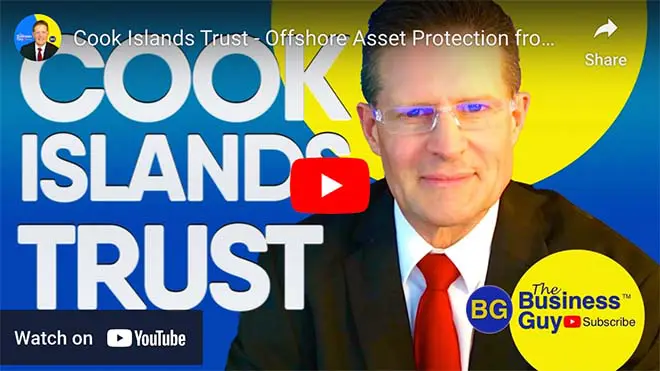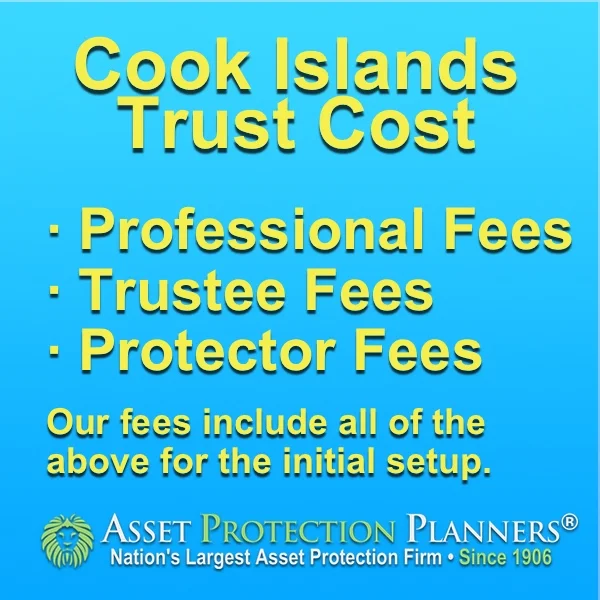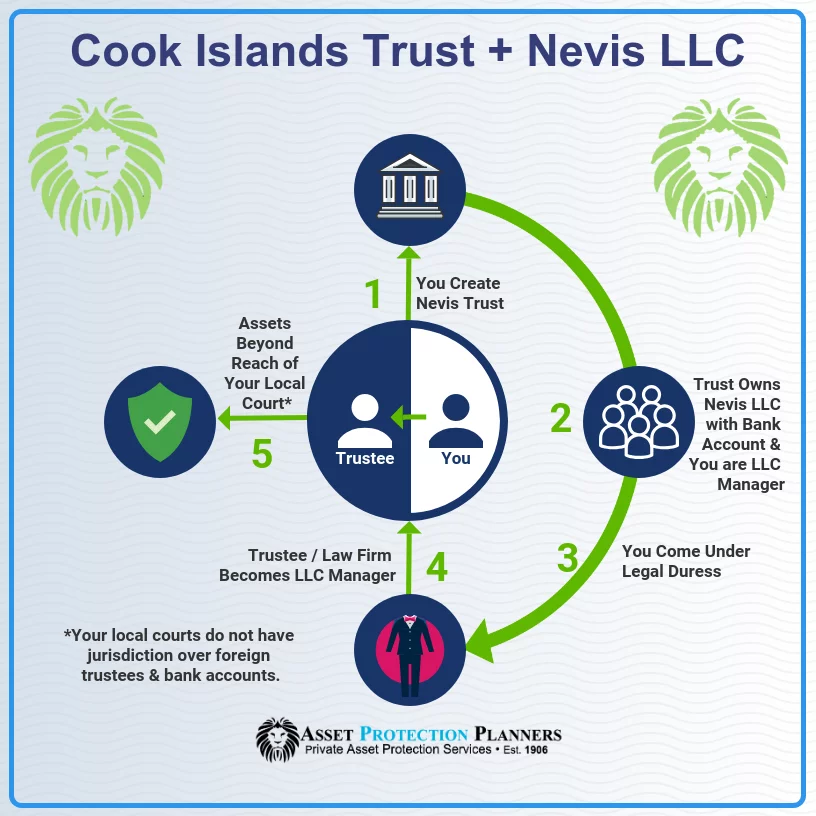Offshore trusts are one of the most effective ways to protect assets from creditors and lawsuits. The Cook Islands is a popular jurisdiction for offshore trusts because of its strong asset protection laws and favorable court rulings. A Cook Islands trust can provide a high level of legal protection against U.S. civil claims and creditors.
Here are some of the key features of Cook Islands trusts that make them attractive for asset protection:
- The Cook Islands is a self-governing territory that is not subject to the laws of the United States. This means that U.S. creditors cannot seize assets held in a Cook Islands trust when one holds funds in a proper international bank account.
- The Cook Islands has a long history of enforcing asset protection trusts. There have been many court cases in the Cook Islands that have upheld the validity of asset protection trusts.
- The Cook Islands International Trusts Act governs Cook Islands trusts. It contains some of the most comprehensive and protective asset protection laws in the world.
If you are considering setting up an offshore trust to protect your assets, the Cook Islands is a good option to consider. It is important to consult with an experienced asset protection professional. You’ll want to ensure that an expert perpares your trust and that you understand what it involves.

How much does a Cook Islands Trust cost?
The cost varies depending on your needs. Our firm has set up more Cook Islands trusts than anyone in the world. On the low end from an inexperienced provider the cost is around $12,000 on up to $50,000 to $75,000 for experienced attorneys. We have seen fees from $250,000 and $50,000 in annual maintenance for complex cases. On average, along with the LLC that goes inside the trust, we’re talking about $20,000 to $30,000 to set up. Annual renewal fees include trustee fees and government filing fees. There may be ongoing retainer fees if you need continuous guidance. Thus, the renewal could cost a grand total of about $5000 to $10,000 annually.
If you’re already in litigation, the risk that someone hauls the provider into a deposition is going to be higher. So, it’s going to cost more. If you have real estate, you’ll need some extra entities. So, that will affect the cost. We highly recommend you use a provider with experience. We’ve seen inexperienced attorneys make big mistakes in the drafting of the documents. Their errors resulted in legal issues for their clients. In our case, our management has been in the asset protection profession since 1991. We know of no client who has lost money in a judgment from one of our Cook Islands trusts. Furthermore, we generally help the client place funds secure international accounts.
Here are some of the factors that can affect the cost of a Cook Islands trust:
- The complexity of the trust: The more complex the trust, the more time and effort the attorney will need to put into it, which will increase the cost. For example, a trust with multiple beneficiaries, complex asset ownership structures, or special tax considerations will be more expensive to set up than a simple trust.
- The amount of assets involved: The more assets you place into the trust, the higher the cost will be. This is because the attorney will need to take additional steps to protect the assets, such as drafting a detailed trust agreement and registering the existence of the trust with the Cook Islands government. (The trust, itself, is private and not filed publicly.)
- The experience of the professional: A professional with more experience in setting up Cook Islands trusts will likely charge more than one with less experience. This is because the more experienced professional will be able to complete the work more efficiently and with fewer mistakes.
- The speed of establishment: If you need the trust set up quickly, the professional may charge a premium for expedited services. This is because the professional will need to prioritize your case over other cases, which will increase their costs.
- The work required by the trustee: The trustee is the company responsible for managing the trust assets. The more work the trustee needs to do, the higher the fees will be. For example, a trust with frequent transactions or distributions will require more work from the trustee than a trust that is mostly inactive. Typically, this cost is quite reasonable and has not raised the eyebrows of our clients.
It is important to note that these are just estimates and the actual cost of setting up a Cook Islands trust may vary. It is always best to speak with us to get an accurate quote.
Here are some additional things to keep in mind when setting up a Cook Islands trust:
- We assign our Cook Islands trust company / law firm to act as trustee. The trustee is the organization that will manage the trust assets.
- We help you with the terms of the trust. This includes who the beneficiaries will and how the trust instructs the trustee distribute assets upon your passing.
- We then register existence of the trust with the Cook Islands government. As stated previously, we do not file the trust, itself, in the public records.
What Do the Fees Include?
The fees associated with setting up an offshore trust typically include:
- Professional fees: These fees cover the cost of drafting the trust documents, registering the trust with the relevant authorities, and providing ongoing support.
- Trustee fees: These fees that we pay to our Cook Islands trust company / law firm that will be responsible for managing your trust. The trustee fees will vary depending on the complexity of the trust and the amount of assets involved.
- Trust protector fees: This is an optional party who can help you do things such as changing the trustee or changing trust jurisdiction in the rare instance that you need these amendments.
It is our standard procedure to contact you annually and collect these fees in one lump sum, to make sure are trust stays up to date for current and future legal protection.
Here is a visual representation of the fees involved in setting up an offshore trust:

It is important to note that the actual fees involved in setting up an offshore trust will vary depending on the specific circumstances. It is always best to speak with a professional to get an accurate quote. You can make contact by phone or by filling out a consultation form on this page.
Are there any additional costs associated with a Cook Islands trust?
There may be additional costs associated with the ongoing maintenance of the trust, such as:
- Accounting fees: These are fees an accounting firm (such as your CPA) charges to prepare financial statements and tax returns for the trust. The amount of these fees will vary depending on the complexity of the trust and the amount of assets involved.
- Tax preparation and reporting fees: A tax preparet charges fees to prepare and file tax returns for the trust. The amount of these fees will vary depending on the complexity of the trust and the settlor’s tax situation.
- Bank fees: Like any bank, the bank that holds the trust’s assets charges fees. The amount of these fees are typically similar to those at your local bank. We can also help you choose a money manager to help invest your money to maximize your return on investment.
Thus, the settlor (the person who creates the trust) will need to budget for these additional costs when considering whether to set up a Cook Islands trust. It is important to speak with one of our professionals to get an accurate estimate of the total costs.
Do Cook Islands trusts cost more than other trusts?
The cost of setting up and maintaining a Cook Islands trust can be more expensive than trusts set up in other jurisdictions. This is because the Cook Islands is a self-governing territory that is not subject to the laws of the United States. This means that U.S. creditors cannot readily seize assets held in a Cook Islands trust.
The Cook Islands also has a long history of enforcing asset protection trusts. There have been many court cases in the Cook Islands that have upheld the validity of asset protection trusts.
In addition, the offshore trust business in the Cook Islands is heavily regulated and requires skilled professionals to navigate. This may result in higher costs for legal advice, trustee services, and administrative expenses.

Is a Cook Islands trust worth the cost?
The answer really depends on your situation and risk level. If the amount you stand to lose is far greater than the cost of the trust, this may influence your decision.
Here are some of the factors to consider:
- Your individual situation: Your financial situation, assets, and risk tolerance will all play a role in determining whether or not a Cook Islands trust is right for you.
- The level of asset protection you need: A Cook Islands trust can provide a high level of asset protection. It is important to understand the limitations of asset protection trusts before you set one up.
- The cost: The cost of setting up and maintaining a Cook Islands trust can be more expensive than other types of trusts. You need to make sure that the benefits of a Cook Islands trust outweigh the costs.
- The legal risks: There are some legal risks associated with setting up a Cook Islands trust, in some cases. You need to make sure that you understand these risks before you proceed.
What are the major Cook Islands trust benefits?
- Asset protection: Cook Islands trusts can provide a high level of asset protection from creditors, lawsuits, and other legal challenges.
- Privacy: The trust documents are not publicly registered, which provides privacy for the settlor and beneficiaries.
- Flexibility: Cook Islands trusts can be customized to meet the specific needs of the settlor.
- Trustee protection: Cook Islands trustees are not bound by foreign court orders, which can help to protect the trust assets from creditors.
- Regulatory environment: The Cook Islands has a favorable regulatory environment for trusts, which can help to minimize the risk of legal challenges.
How do I set up a Cook Islands trust?
The first step is to consult with an experienced professional, such as our organization, that specializes in Cook Islands trusts. The consultant will help you to determine if a Cook Islands trust is right for you and will guide you through the process of setting up the trust.
What are the disadvantages of an offshore trust?
- Cost: The cost of setting up and maintaining an offshore trust can be high.
- Complexity: Offshore trusts can be complex to set up and maintain.
- Tax filings: Offshore trusts usually require tax filings for the settlor and, upon the settlor’s passing, the beneficiaries.
- Regulation: Offshore trusts are subject to regulation in the jurisdictions where they are established and operated.
Are Cook Island trusts safe?
Cook Islands trusts are considered to be safe and secure. Each year, Transparency International publishes their annual Global Corruption Perceptions Index. Accoording to their annual report, New Zealand is one of the most trusted jurisdictions worldwide. The Cook Island are part of New Zealand. The Cook Islands has a strong legal system and a favorable regulatory environment for trusts. Many legal professionals suggest the Cook Islands trust as the safest option for protecting assets from lawsuits.
Conclusion
A cook Islands trusts can be a valuable asset protection tool for individuals and businesses. There is no one-size-fits all answer to the question, “How much does a Cook Islands trust cost?” We have discussed the cost of a Cook Islands Trust. We have gone over what is included. We have covered the benefits and disadvantages to give a balanced approach. Finally, we discussed the safety of a Cook Islands trust.
It is important to know how this powerful tool may apply to your situation. We have experienced attorneys and consultants available to discuss your needs and to help you decide if a Cook Island trust is right for you. You can fill out a free strategy session form on this page.



